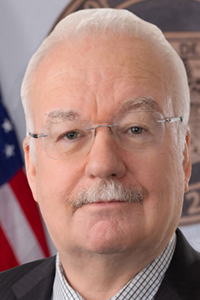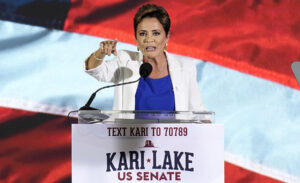A Fountain Hills senator is moving once again to pass laws to lock up - or at least fine - those who get in the way of Arizonans on the road.
A Fountain Hills senator is moving once again to pass laws to lock up – or at least fine – those who get in the way of Arizonans on the road.
And that doesn’t mean a tourist driving 35 on a 65 mph stretch of freeway, something that already is illegal.
Republican John Kavanagh wants to make it a felony for protesters to block a highway, bridge or tunnel for more than 15 minutes after they’ve been told to leave. And his measure would make it a Class 6 felony which carries as presumptive sentence of a year in state prison.
 Sen. John Kavanagh
Sen. John Kavanagh
The idea, he told Capitol Media Services, came to him while he was watching a news report on television on a group of protesters who had blocked the westbound lanes of the Bay Bridge going into San Francisco for about four hours by laying down. They were demanding a cease fire in Gaza.
Why they were doing it, Kavanagh said, is irrelevant.
“No restrooms, a couple of vehicles had organs that were supposed to be going to a place for a transplant,” he said.
Right now, a general statute about blocking traffic that creates an “inconvenience or hazard” is a Class 2 misdemeanor, punishable by up to four months in the county jail and a $750 fine. That, said Kavanagh, is insufficient.
“It seems to me that if a small group of people literally steal four hours of thousands of people lives for their protest, it should be more than a little misdemeanor,” he said.
His measure has some limits, and not just that it would not apply to city streets.
The action would have to block at least 200 people from where they are going. And it would become a felony only if the protesters remain for at least 15 minutes after being told to leave.
Kavanagh, a former Port Authority of New York police officer, said he doesn’t see this as creating a hurdle for law enforcement.
“Police can book 50, 100 people,” he said. “It’s usually not that many blocking.”
Photos from the Nov. 16 incident show about 200 individuals, including some who lay down on the roadway — some chained together — covering their bodies with white sheets and placards that read “11,000 dead.” Others held banners that stretched across the roadway with messages like “Free Palestine.”
Police in San Francisco made arrests using other charges, including false imprisonment, refusing to comply with a police officer, unlawful public assembly, and refusing to disperse.
Kavanagh acknowledged Arizona has similar laws. But he said it makes sense – for all involved – to have a law that governs this specific type of incident.
“People need to have fair warning for what’s illegal,” Kavanagh said. He said the other statutes cover various situations that a common person might not understand would apply in such a protest situation.
“This is straightforward: If you do this, this is what happens,” Kavanagh said.
And Kavanagh said there’s nothing political about the measure and the kinds of protests taking place.
“It could be conservative, liberal, anything,” he said.
“It doesn’t make any difference what you’re protesting,” Kavanagh continued. “You don’t literally hold hundreds of people captive because of your protest.”
This isn’t the senator’s first foray into altering state laws because some motorists are blocked or otherwise inconvenienced.
In 2015 Kavanagh said that his nightly trip home from the Capitol was slowed as he was getting off the Superstition Freeway to the Beeline Highway. The cause: a panhandler at the bottom of the exit ramp.
“The minute the light would turn green, he’d hit the crosswalk button, not to cross the crosswalk but to cause the light to cycle faster so he could solicit more people, thus slowing everybody down without good cause,” Kavanagh told Capitol Media Services at the time.
Unable to find a crime that fit, the senator crafted a measure to make it a Class 3 misdemeanor – 30 days in jail and a $500 fine – to intentionally activate a pedestrian signal to stop traffic and solicit donations. It is now law.
A year later, Kavanagh was at it again after protesters tried to block a Donald Trump rally in Fountain Hills.
That, in fact, was illegal. But Kavanagh said the Class 3 penalty that comes with that might be appropriate for someone “being rowdy on Mill Avenue in Tempe and blocking a car.”
This, he said, was different, trying to block not just those seeking to attend the event but even keep Trump himself away.
“I consider that kind of behavior extremely corrosive to democracy,” Kavanagh explained at the time. So his measure, approved by the full Legislature, made it a Class 1 misdemeanor, with a maximum penalty of six months in jail and a $2,500 fine, for intentionally blocking a highway or entrance into a public forum “that results in preventing other persons from gaining access to a governmental meeting, a governmental hearing or a political campaign event.”









